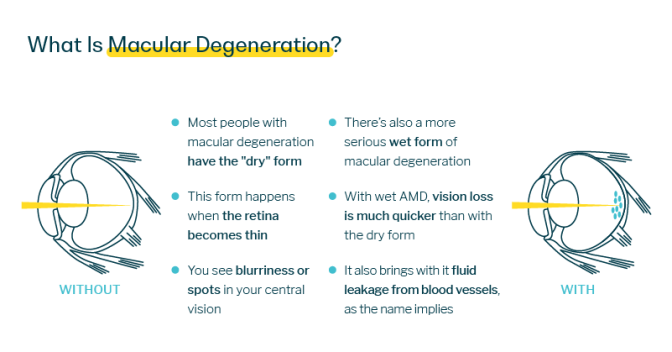50% OFF a Complete Pair of Glasses
*Restrictions apply. Click here for details.
Understanding Macular Degeneration Surgery: A Comprehensive Guide
Macular degeneration is a progressive, age-related eye condition that affects the macula, the part of the retina responsible for sharp, central vision. Over time, this condition can make everyday activities like reading, driving, and recognizing faces more challenging due to blurriness or distortion in the center of your vision. While macular degeneration has no cure, there are both surgical and non-surgical treatment options that can help slow its progression and preserve as much vision as possible.
One option in certain cases is laser surgery, a procedure designed to stabilize retinal damage and help prevent further deterioration. While not every patient will need or benefit from laser treatment, understanding the available treatment options is essential for managing your eye health effectively. Keep reading EyeCare Associates’ comprehensive guide to learn more about macular degeneration, available treatments, and what to expect if surgery is recommended for your condition.
The Two Forms of Macular Degeneration

Macular degeneration is a progressive eye condition that results from age-related changes in the retina, specifically in the macula. While vision loss from macular degeneration typically occurs gradually, it can significantly affect your ability to see fine details over time.
The condition primarily exists in two forms: dry age-related macular degeneration (dry AMD) and wet age-related macular degeneration (wet AMD). Understanding the differences between these types is essential for early detection, treatment, and long-term vision management.
Dry AMD
Approximately 80% of individuals diagnosed with macular degeneration have the dry form of the disease¹. This condition occurs when the macula gradually thins and accumulates drusen—small protein deposits that interfere with normal vision processing. Over time, this can cause blurry or distorted central vision, making daily tasks like reading or driving more difficult.
Although dry AMD does not have a cure, it generally progresses slower than wet AMD. However, without intervention, it can still lead to significant vision impairment. To help slow the progression, eye care specialists may recommend lifestyle modifications and nutritional supplements rich in antioxidants, zinc, lutein, and zeaxanthin, which have been shown to support macular health.
Wet AMD
Wet AMD is less common but far more aggressive. It occurs when abnormal blood vessels form beneath the retina. These new blood vessels are fragile and prone to leaking fluid or blood, which leads to scarring and permanent damage to the macula.
As scarring progresses, individuals with wet AMD may experience rapid vision loss, particularly in the center of their field of vision. Because of its fast-moving nature, early detection through routine eye exams is critical. If caught early, treatment options such as anti-VEGF injections or laser therapy can help reduce blood vessel growth, minimize leakage, and slow further vision loss.
Treatment Options for Macular Degeneration
The best way to preserve your vision when dealing with macular degeneration is through early detection and timely intervention. Since treatment options depend on whether you have dry or wet AMD, it’s important to schedule an eye exam immediately if you experience sudden or noticeable changes in central vision, such as blurriness, distortion, or dark spots. At EyeCare Associates, our eye doctors can evaluate your condition and recommend the most effective treatment plan to help slow progression and protect your eyesight.
Wet AMD
Wet AMD progresses more quickly than dry AMD, but several medical treatments can help slow its advancement and minimize vision loss. Common treatments include:
Anti-VEGF Injections: Medications such as anti-vascular endothelial growth factor (VEGF) drugs² help prevent the growth of abnormal blood vessels under the retina, reducing fluid leakage and slowing vision deterioration.
Photodynamic Therapy (PDT): A two-step treatment that involves injecting a light-sensitive medication into the bloodstream followed by a non-thermal laser application to target and destroy abnormal blood vessels.
Laser Photocoagulation: A non-thermal laser procedure³ used to seal off and eliminate leaking blood vessels, preventing further damage to the macula.
Dry AMD
Currently, there is no cure for dry AMD, but research indicates that certain nutritional supplements can help slow its progression. These nutraceuticals typically include antioxidants, zinc, lutein, and zeaxanthin. In addition to supplements, maintaining a healthy lifestyle can make a difference. Eating a nutrient-rich diet, avoiding smoking, and protecting your eyes from UV exposure are all ways to support macular health and help manage dry AMD.
What to Expect with Macular Degeneration Surgery
Laser photocoagulation surgery is an option for managing wet macular degeneration, helping to slow disease progression and prevent severe vision loss. However, this procedure does not reverse existing vision loss and may create some scarring, which can introduce new blind spots in your field of vision. Your EyeCare Associates eye doctor will discuss whether macular degeneration surgery is the right choice for you based on the severity and location of your abnormal blood vessel growth. This procedure is generally most effective for patients whose blood vessels are clustered together, as opposed to those with more widespread formation. Here’s what to expect from macular degeneration surgery at EyeCare Associates:
Preparing for Surgery
Before considering laser photocoagulation, it’s important to explore all available treatment options. Like any procedure, macular degeneration surgery carries some risks, including potential additional vision loss. Many patients try medication treatments, such as anti-VEGF injections, before opting for surgery.
If you and your eye doctor decide that surgery is the best course of action, preparation is minimal. Your eyes will be dilated with special eye drops before the procedure, and you should arrange for someone to drive you home, as you may experience blurred vision afterward.
During Surgery
When you arrive for your procedure, you will be seated comfortably for treatment. Your doctor will begin by dilating your pupils with eye drops and may apply a local anesthetic or numbing drops to ensure comfort.
Once the procedure begins, you will position your face on a chin rest, and a specialized lens will be placed in front of your eye to help focus the laser. Your doctor will ask you to look straight ahead or focus on a designated light.
A precisely controlled laser will then be used to target and seal leaking blood vessels in the retina. Each laser pulse will create a small flash of light, and the number of pulses used will depend on the extent of abnormal blood vessel growth. The entire procedure is quick and typically lasts about 30 minutes.
Recovering from Macular Degeneration Surgery
Following the surgery, your doctor may cover your eye with a patch or bandage. Your pupils will remain dilated for several hours, and you may experience temporary blurred vision or floaters, which should improve over time.
Your doctor will provide specific post-operative care instructions, including how long to keep your eye covered, what medications you can take for discomfort, and when to return for follow-up visits. Remember, laser photocoagulation cannot cure macular degeneration, nor can it restore vision already lost. However, by sealing off abnormal blood vessels, this procedure helps slow disease progression and reduces the risk of further damage to your central vision. If you are experiencing symptoms of wet AMD, scheduling an evaluation at EyeCare Associates can help determine the best treatment plan for your needs.
Explore Your Macular Degeneration Options at EyeCare Associates

Think you may need macular degeneration surgery? Find an EyeCare Associates location near you to schedule an appointment. Our team of highly trained eye care professionals provide comprehensive eye care including routine eye exams, preventative care, and treatment.
